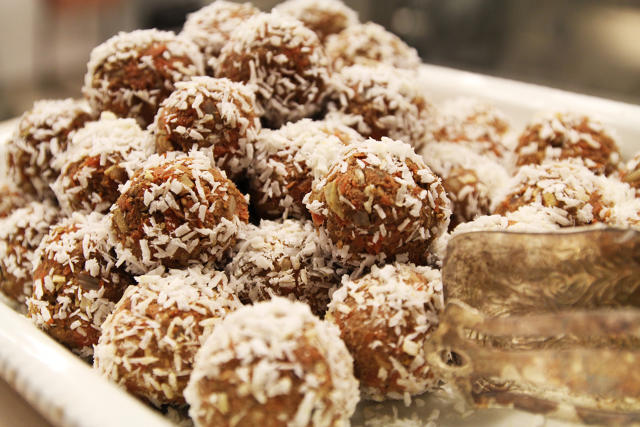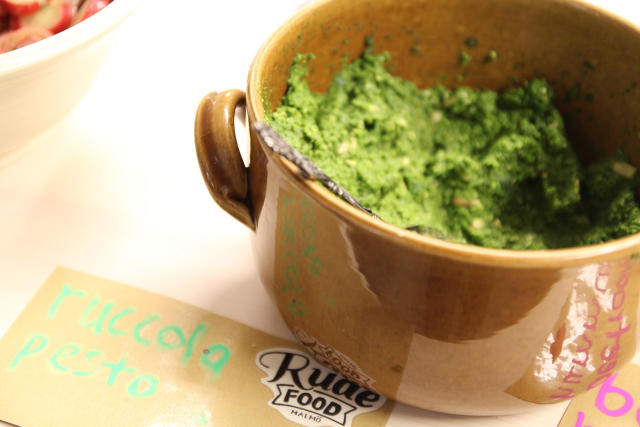Eat From This Catering Service That A Dumpster Diver Would Love
Rude Food serves exciting and accessible meals made from salad bar leftovers, blemished bananas, and other would-be throwaways.
Food waste is the cause du jour. Newspapers are now offering up food waste recipes, celebrated chef Dan Barber recently opened up a food waste pop-up restaurant in New York City, and across the world, other food waste experiments are emerging.
Rude Food, an all-volunteer, mostly vegan food waste catering service in Malmö, Sweden, is taking on this challenge a little differently. Instead of coming up with recipes that no average human cook could hope to replicate—or only using leftovers and ignoring all the other kinds of food waste—Rude Food makes accessible foods, like pickled beetroot, carrot halvah (made with carrot peels), rucola pesto, and cabbage chips, sourced from all sorts of places.

"There is this trend of big names in the food industry that close their restaurant for two weeks and say, 'We will only cook food waste.' They come up with recipes where I have to put my foot down. With our menu we think differently about what is cooking, what we consider to be finished and ready," says Rude Food founder Zeenath Hasan.
Rude Food is a spinoff of Hasan's restaurant, Tapori Tiffins. Every weekend, Rude Food holds a food waste brunch in the restaurant. Food items come from the caterer's partners, which include a local supermarket, organic farm, and a university cafeteria that lets Hasan and her colleagues take fresh salad from its salad bar at the end of each week.
When the food waste brunch started out, it was only for close friends and local dumpster divers. Now, it's mostly people with no connection to Tapori Tiffins. Every week has a completely different menu; last week, Rude Food used 154 pounds of bananas from a supermarket partner to make Caribbean banana curry and banana ice cream. Certain items, like dry grains, don't come from food waste, but 95% of everything that Rude Food makes comes from either "expired" items, blemished produce, or leftovers (like from the salad bar).

Next week's meal will feature a vegan meat substitute—a somewhat unexpected ingredient for a catering service that mostly focuses on whole foods. "There are lots of vegans in the city, but only in certain parts. We have a supermarket that’s a food waste partner in an area with few vegans, so their vegan section expires and there’s a lot of this," says Hasan.
When the food waste brunches proved to be a success, Rude Food expanded into catering for outside organizations—mainly nonprofits and city agencies. The venture has been successful enough that Rude Food can pay for its rent, electricity, and food costs (food is 5% of the budget, compared to 25% for a normal restaurant). In a few months, Hasan expects that she'll be able to hire both a full-time chef and a product manager.
Rude Food also bottles and sells some of its creations, like pickles and relish. "It taps into the idealist inside each of us when we see a food waste product on a shelf to be bought as a consumer," says Hasan. "That’s where we want to make an impact."
No comments:
Post a Comment